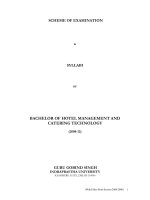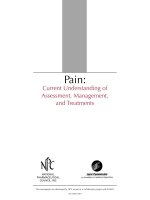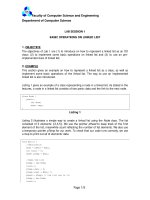Faculty of business management and professional
Bạn đang xem bản rút gọn của tài liệu. Xem và tải ngay bản đầy đủ của tài liệu tại đây (438.05 KB, 13 trang )
INDIVIDUAL ASSIGNMENT
(Earning Management: Is it Good or Bad?)
KELLY WEE KHENG SOON (Student ID: 012010110116)
(DAC 5013: ACCOUNTING FOR CORPORATE DECISION AND EVALUATION)
FACULTY OF BUSINESS MANAGEMENT
AND
PROFESSIONAL STUDIES
MANAGEMENT AND SCIENCE UNIVERSITY (MSU)
(MALAYSIA)
Page 1
Electronic
Electroniccopy
copyavailable
availableat:
at: /> />
TABLE OF CONTENTS
1.0 Introduction
1.1. Objective
2.0 Literature and theories
3.0 Earning Management
3.1 Definition of Earnings Management?
3.2 Flow of Earnings Management
A) Pattern of Earnings Management
B) Motivation of Earnings Management
C) Good side of Earnings Management
D) Bad side of Earning Management
E) Implication to Accounting
4.0 Future Research
5.0 Conclusions
6.0 References
ABSTRACT
Use of accounting discretion to address financial statements seems to be eroding public
confidence in the financial reporting process. Some managers are abusing GAAP‘s afforded
discretion to manage earnings thus reducing the quality of the financial reporting process and
ultimately bring adverse effects on resource allocation in the economy. Market participants,
legislators, regulators, and academics are concerned in order for them to have the need to control
financial reporting abuses. In this paper, I briefly analyze the recent literature and theories on
earnings management and show the techniques used by managers to manipulate earnings. I found
strong incentives and reasons for managers to report such smooth and increasing earnings by the:
a) increase market capitalization; b) enhance management compensation and job security; and c)
reduce the company‘s cost of capital. The evidence found suggests that the managers used: a) big
bath restructuring charges; b) miscellaneous cookie jar reserves (a hidden reserve that do not
show up on the balance sheet (understating values) which can be used to adjust quarterly
earnings reports c) premature and aggressive revenue recognition; and d) creative acquisition
accounting and purchased R&D to manage earnings.
Keywords: Accounting, Earning Management, GAAP
Page 2
Electronic
Electroniccopy
copyavailable
availableat:
at: /> />
1.0
Introduction
This research paper is to examine whether earning management is it good or bad. Though there
is so many debate about whether it should be accepted to be good rather than bad, however, this
research will explain the both side of earnings management. Earnings management reduces the
quality of financial reporting, it can interfere with the resource allocation in the economy and can
bring adverse consequences to the financial market. The last few years many cases of severe
accounting manipulation occurred leading to the collapse of several major corporations such as
Enron, Parmalat, Refco and Worldcom whereby their earnings management need no additional
comments because of the damages they brought to the economy. This research paper analyzes
both, causes and motives of earnings management as well as possible remedies. Therefore, it is
not surprising that market participants, legislators, regulators, and academics are concerned with
the need to control financial reporting abuses. Responsible authorities seem to be concerned with
the pervasiveness of earnings management. Since 1998, after Levitt's speech addressing the need
to control earnings management, the Securities and Exchange Commission (SEC) has been on
the lookout for selective disclosure. Business Week recently published that the number of
restatements more than tripled in the last 3 years briefly review the recent literature on earnings
management and show the incentives as well as the techniques used by managers to manipulate
earnings.
1.1
Objective
Objective of this paper is to do a research on the definition or meaning of ―Earning
Management‖ and how the effect to the good side and the bad side of it and what are the
remedies or solution in the future. Prior to the research, I will quote some of the previous and
recent literature review or theories to explain the said definition, outline the reason for the impact
to appreciate the good and the bad of earnings management. I will conclude my paper by
summarizing this research paper with strategic aspect of right ethics of accounting policy and
recommended solutions thru initial stage of education, training and awareness to accounting
students and external users on earnings management within GAAP guidelines and tools to
auditors to spot some of techniques used for earning management.
Page 3
Electronic copy available at: />
2.0
Literature and Theories
Literature review in earnings management proposes different theories for why firms manage
earnings. Prior to recent scandals in accounting, creating volume of new literature on the quality
of earnings and the earnings management phenomenon. At least one aspect of earnings
management—income smoothing—has been known and debated since before Ronen and .
Sadan‘s 1981 Smoothing Income Numbers: Objectives, Means, and Implications, as attested to
by their excellent summary of a vast number of empirical studies on the subject up to that time.
One of the theory, Healy and Wahlen (1999) observed that many aspects of this definition
deserve additional comments. Earnings management occurs when managers use their judgment
in financial reporting and in structuring transactions to alter the financial reports to either mislead
some stakeholders about the underlying economic performance of the company or even to
influence contractual outcomes that depend on reported accounting numbers referred by
(HEALY; WAHLEN, 1999).
Studies of specific earnings management tools and the effect of earnings management on
resource allocation was suggested. At that time, they urged the accounting profession to consider
areas where standards could be altered to decrease the ability to manipulate earnings—places
where it would make the most difference in assuring efficient resource allocation. Healy‘s
evidence that bonus plans motivate earnings management helps students to take contracting
theory seriously. It opens up a whole new set of considerations in accounting policy choice
beyond the disclosure of useful information to investors. Watts and Zimmerman (1978) had
reffered to the argument that managers alter reported accounting numbers to maximize their
bonus, avoid tripping debt-covenants written on accounting numbers or to reduce their firm‘s
political visibility. Graham, Harvey and Rajgopal (2005) had done a survey with Chief Financial
Officers who indicate they manage earnings to maintain or increase the stock price of their firms.
A vast literature reffered by (Fields, Lys and Vincent 2001) for references) has validated the
Watts and Zimmerman (1978) propositions. However, there is managerial incentives to manage
earnings to address stock price concerns are relatively under-explored.
Accrual accounting will lead to smooth earnings and generate a number that is more useful for
investor to predict future earrings compare to cash accounting. In order to describe on earnings
management I need to define the point at which managers‘ accrual decisions result in too much
smoothing and so become earnings management (Dechow and Skinner 2000).Analyze
conservative accounting, neutral accounting, aggressive accounting, and fraudulent accounting, I
can make distinction between fraud and earnings management (Dechow and Skinner 2000).
Dechow and Skinner [2000] contrasted the perceptions of academics, practitioners, and
regulators, finding that academics are less disturbed by earnings management (understating the
problem due to the belief in efficient markets and difficulty in modeling earnings management)
than are regulators and practitioners (who overstate the problem because of the inherent
flexibility of GAAP, the existence of full disclosure, and the growing number of creative
accounting innovations).In late 1998. the former Chairman of the Securities and Exchange
Commission (SEC) Mr. Arthur Levitt referred earning management to as a process that has
become a ―game of nods and winks‖ among corporate managers, auditors, and analysts (Levitt,
1998, p. 14). He put the accounting profession on notice that those who are operating in the gray
Page 4
Electronic copy available at: />
area between legitimacy and outright fraud are poisoning the financial reporting process (Levitt,
1998, p. 19).
3.0
Earnings Management?
The definition of earning management was given by Schipper (1989, 1992) who defined it as ―…
purposeful intervention in the external financial reporting external process with intent to obtain
some private gain ―
In accordance to Healy and Wahlen (1999), "Earnings Management" occurs when managers use
judgement in financial reporting and in structuring transactions to alter financial reports to either
mislead some stakeholders about the underlying economic performance of a company or
influence the contractual outcomes that heavily depend on reported accounting numbers.
Earnings management is the choice by a manager of accounting policies, or real actions that
affect earnings, so as to achieve some specific reported earnings objective. Earnings management
involves the artificial increase (or decrease) of revenues, profits, or earnings per share figures
through aggressive accounting tactics on all earnings. Aggressive earnings management is a form
of fraud which differs from reporting error.
Most of this happen is when management of the companies need to present and show the
earnings at a certain level or certain loopholes in financial reporting standards. Practically, the
management will alter the numbers to achieve desired aims or to satisfy projections by financial
analysts or in other words attempts by management to influence or manipulate reported earnings
by using specific accounting methods (or changing methods), recognizing one-time nonrecurring items, deferring or accelerating expense or revenue transactions, or using other
methods designed to influence short-term earnings.These are fraudulent reporting due to not
fulfilling the accounting practice principles with the techniques of revenue recognition,
accounting policy change, timing adoption of new standards, write-off, asset sales, provisions,
accruals(discretionary) and direct charges to retained earnings. Market expectation sentiment,
individual bonus, to maintain position in the specific industry. All this probable actions is due to
downturn in business.
Accounting practice principles need to adhere such as integrity of individual. Types of Earning
Management is a) Unsuitable revenue recognition b) Inappropriate accruals and estimates of
liabilities c) Excessive provisions and generous reserve accounting d) Intentional minor breaches
of financial reporting requirements that tied to material breach. All of this had been used by
some companies to influence the figures by bending the rules rather than breaking them,
anticipate or increasing the income reduce or delay the recognition of the expenses and shifting
way from debt or losses.
Page 5
Electronic copy available at: />
3.1
Flow of Earnings Management
Figure (a)
Earning Management
Based on the figure (a) as shown above, we can see how the flow of the earning management.
We will need to spot the pattern of the earning management. Identify what is key driver of
motivation either an earning management is good or bad. This will enable us to analyze the good
and bad side nature of the earning management, resulting to the implication of the accounting
principles and financial reporting. The whole chronological of the flow will be explained as
below.
Page 6
Electronic copy available at: />
A) Pattern of Earning Management
1) Big Bath accounting is the process where publicly traded corporations write-off or
write-down certain assets from their balance sheets in a single year. The write-off will
help removes or reduces the asset from the financial books and results in lower net
income for that year.
2) Income Minimization
3) Income Maximization
4) Income Smoothing
B) Motivations of Earnings Management
1) Contractual motivations
Bonus plan hypothesis: to manage cash bonus
- Evidence and Findings from Healy (1985)
Debt covenant hypothesis: to manage debt covenants
- Research thru evidence from Dichev & Skinner (2002)
2) Political cost hypothesis
To lower political ―heat‖
Cross-examining report from Jones (1991)
3) Some of the driver of earnings management to meet earning expectations: Significant negative effects on share price and manager reputation if
expectations not met
Other motivations
Initial public offerings
C) Good Side of Earning Management
There is definitely a good side of earning management if it is properly practice for the
benefits of the companies prior to achieving the key performance objective of the companies.
Good earnings management means ―reasonable and proper practices‖. ―Accounting
Subjectivity and Earnings Management: A Preparer Perspective‖ referred by Parfet (2000 p.
487) contends: calls attention to ―the context in which decisions are made, where subtle
effects from human perceptions and peer pressures, the complexity of combined factors, and
a high-stakes business environment all impact good people who are trying to do their jobs
with integrity. Good side of earnings management describe in the arguments shown in (1)
and (2).It briefly describe, from contracting perspective earnings management was
anticipated by the principal when the bonus contract was being negotiated, so that it is
allowed for in setting the bonus rate. Firstly, lowering contracting costs in the face of rigid
and incomplete contracts. Secondly, earnings management can reveal inside information to
Page 7
Electronic copy available at: />
investors. One of the example usually referred to is General Electric Co. (GE) as simple
announcement by GE of its persistent future earnings is ‗blocked.‖
The two arguments mentioned below on good side of earnings management as below was
referred thru online by Robert C. Lipe (2001) .
1) Incentives given on contracts
a) Bonus is given on net income referring to contract
Volatility of the new accounting standards may lead to lower net income
May adversely affect manager effort
b) Debt covenant contracts
New accounting standards may increase probability of debt covenant violation
Contract violation is costly, earnings management may be low-cost way to
work around
2) Investor-based arguments
Credibly communicate inside information to investors
a) Blocked communication may inhibit direct disclosure of earnings expectations
b) Discretionary accrual management as a way to credibly reveal management‘s
inside information about earnings expectations, some of examples : Manager foolish to report more earnings than can be maintained
Manager reported earnings to an amount management expects will persist
D) Bad Side of Earning Management
Bad earning management means intervention to hide real operating performance. Some
of the techniques used that will influence bad earnings management is as follow below
based on my investigation from some of the research done in the past.
1) Contracting Perspective
From a contracting perspective, we can think that managers manage earnings to
opportunistically maximize their utilities. Healy (1985) examines that managers act on
their self-interest when their bonus schemes are tied to the reported net incomes.
However, managers not only manage earnings for self-interests but also manage earnings
for an efficient contracting. Healy (1985) found that managers utilize such information
superiority to maximize their wealth on their bonus scheme which suggests that managers
might possibly manage earnings to protect their bonuses. This is the contract between the
firm and the managers. Research examining SEC enforcement actions has found that
accrual information is a key determinant of the earnings manipulation (Dechow, Sloan
and Sweeney, 1996). Therefore, it is reasonable to assume that earnings restatement firms
can be characterized as firms who knowingly and intentionally engaged in earnings
manipulation.
Page 8
Electronic copy available at: />
2) Financial Reporting Perspective
Based on Hanna (1999) article in CA magazine review, important point to get across
from this article is that management is tempted to provide excessive unusual, nonrecurring and extraordinary charges, to put future earnings in the bank. Furthermore,
these future earnings are buried in operations. This makes it difficult for investors to
diagnose the reasons for subsequent earnings increases.
Investors and analysts look to core earnings, ignoring extraordinary and non-recurring
items Implies manager not penalized for non-core charges, such as write-downs,
provisions for restructuring. But current non-core charges increase core earnings in
future years, through lower amortization and absorption of future costs. As a result,
managers tempted to ―overdose‖ on non-core charges, thereby putting earnings ―in the
bank‖ also called cookie jar accounting. Referring to securities market reaction, Hanna
found evidence that market uses frequency of such charges as proxy for their misuse-lower ERC when greater frequency ( example: Nortel Networks‘ reversals of its excess
accruals)
E) Implication to Accounting
1) Earnings management can be good if used responsibly. I investigate that even some of
the evidence from‖ Arya, Glover, and Sunder (2003) asks the question, ―Are Unmanaged
Earnings Always Better for Shareholders?‖: Practice of ―Income manipulation is not an
unmitigated evil: within limit it promotes efficient decision‖ [p 111]. It is also
management‘s ability to distinguish transient changes in income from permanent income
better than external users. Investing public doesn‘t really want to know what a firm made
this year; they are really only interested in its promise for the future Focus had been made
to ensure increase in the income by the management to ensure the performance of the
companies.
2) Full disclosure helps to control bad earnings management
Revenue recognition policies
Unusual, non-recurring and extraordinary events
Enables investors to better evaluate earnings persistence
Effect of previous write-offs on current core earnings
Page 9
Electronic copy available at: />
4.0
Future Research
Prior to future research, a lot more need to be done to curb all malpractice in the accounting
principles, though SEC‘s effort on cracking down on earnings management abuse. Proactively
approach need to be taken by the profession of public accounting. Training schemes need to be
given to auditor‘s with annual update on how they are perpetrated. What steps need to be taken
knowing that there is manipulation of earnings within GAAP and income smoothing such as
inappropriate revenue recognition, accounting policy change, timing adoption of new standards,
write-off, asset sales, provisions, accruals(discretionary) and direct charges to retained earnings
and all the other accounting and fraudulent reporting.
Professional code of ethics in terms of credibility, integrity and confidentiality had been
questionable without doubts, furthermore, companies or corporations with such practice will lose
credibility in the capital markets though facing with new laws to curb such conduct and
management practices such as the Sarbanes-Oxley Act. Accounting profession have to return to
its ethical values traditional, however, the questions is how does this relate to the earnings
management debate? How do we restore ―public confidence in [our]…service‖ [p. 48]?
Awareness and further educating accounting student on what Parfet referred to as earning
management (vs manipulation) with the abusive of earning management practices, better help
them to share the right ethics practice with their financial managers and other superiors. In
addition, more effort of introducing tools necessary to identify earnings management techniques
to better equip Chartered Public Accountant (CPA).
Education will reduce the expectations gap between auditors and financial statement users. Most
firms that fraudulently misstated earnings through earnings management had employed Big Five
public accounting firms as their auditors referred by Robinson-Backmon and Finney (Research
on Accounting Ethics 1999, 5: 77-93). Education thru business and professional publications
could help their readers by publishing articles on how to detect and deter earnings management
schemes.
There is even suggestion in the future that that since auditors are in the best position to assess a
firm‘s earnings quality because of their familiarity with GAAP, the client‘s controls, and its
business practices. Researchers have proposed that auditors should prepare a ―quality of earnings
report‖ on the income statement.
Finally, in accordance to the benefits of the investing public (external user) or even students
clearer understanding of earning management is (and/more importantly, is not) necessary to
ensure an accuracy of understanding towards the future of accounting information.
Page 10
Electronic copy available at: />
5.0
Conclusions
The concept of the earnings management is difficult to define and very subjective to decide
whether it is an appropriate accounting treatment or it is an earnings management. Prior to
review and analysis of researches I conclude with definition that agree with SEC. I believe that
earnings management not only due to violation of GAAP but also aggressively choose GAAP
method that are considered as earnings management. This broad definition may discourage
earnings management and benefit financial statement users by increasing the quality of the
information provided. Earnings management can be examined from different aspects thru many
ways. There is a relationship between professional ethics and earnings management. A strong
sense of ethics would discourage earnings management. As manager he has a potential to assess
accounting treatment in favor of his interests according to agency theory. Managers have some
degree of flexibility and discretion in reporting their financial statement to reflect underlying
economic of their corporations. The flexibility gives managers opportunity to manipulate
earnings. Managers may choose accounting treatment guided under GAAP to reduce the risk of
violating of GAAP even it is not the most appropriate method to reflect the company‘s economic
situation. From the whole flow of earning management, we need to examine the pattern and
motivation of earning management what really drives the good and bad side of earning
management. Management compensation is on of the most important incentive for earnings
management. Managers may use timing of transactions, discretional accruals, and bad debt
expenses to manage earnings to increase stock price and receive gain from stock options.
Earnings management should be discouraged even if investors could see through accounting
numbers.
However, the I truly believe thru this research findings that earnings management should be
discouraged because the financial statement is supposed to provide real performance of the
company to users.
Page 11
Electronic copy available at: />
6.0
References
1. Arya, A., J. Glover, and S. Sunder. 2003. ―Are Unmanaged Earnings Always Better for
Shareholders?‖ Accounting Horizons (Supplement): 111-116.
2. Dechow, P.M., R.G. Sloan and A. Sweeney, 1996. Causes and Consequences of
Earnings Manipulation: An analysis of Firms Subject to Enforcement Actions by the
SEC. Contemporary Accounting Research 13, 1-36.
3. Dechow, P. and D. Skinner. 2000. ―Earnings Management: Reconciling the Views of
Accounting Academics, Practitioners, and Regulators.‖ Accounting Horizons 14 (2): 235-250.
(Journal version: February 2000 – Pg 1 -25 (refer as attached))
4. Demski, Joel S. and David E.M. Sappington (1987), ―Delegated Expertise‖,Journal of
Accounting Research, Vol. 25 (1), pp. 68-89.
5. Graham, J., C. Harvey and S. Rajgopal. 2005. The economic implications of corporate
financial reporting. Journal of Accounting and Economics 40, 3-73.
6. Hanna‘s 1999 article in CA Magazine
7. Healy, P., 1985, The effect of bonus schemes on accounting decisions, Journal of Accounting
and Economics 7, 85-107.
8. Healy, P. M. and J. M. Wahlen. 'A review of the earnings management literature and its
implications for standard setting', Accounting Horizons, December 1999, pp. 365–383.
(Journal version based on Preliminary Draft: November 1998 – Pg 1 -34 (refer as attached))
9. Levitt, A., Jr.: 1998, ‗The Numbers Game‘, The CPA Journal 68, 14–19.
10. Thomas D.Fields , Thomas Z.Lys, ―Empirical Research on Accounting choice‖, pp.255-307
11. Parfet, W. 2000. ―Accounting Subjectivity and Earnings Management: A Preparer
Perspective.‖ Accounting Horizons 14 (4): 481-488. (Journal version: Pg 1 -13(refer as attached))
12. Robinson-Backmon and Finney (Research on Accounting Ethics 1999, 5: 77-93)
13. Robert C.Lipe. 2001 ― Lease Accounting Research and the G4+1 Proposal: Accounting
Horizons Vol.15 No.3, Sept 2001, pp299-310
Page 12
Electronic copy available at: />
14. Ronen, J. and S. Sadan. 1981. Smoothing Income Numbers: Objectives, Means, and
Implications. Reading, MA: Addison-Wesley Publishing Co.
15. Schipper, Katherine, 1989, Commentary on Earnings Management, Accounting Horizons,
vol. 3, issue 4, p. 91 – 102.
16. Smith, L. 2003. ―A Fresh Look at Accounting Ethics (or Dr. Smith Goes to Washington).‖
Accounting Horizons 17(1): 47-49.
17. Watts. R.L. & Zimmerman. J.L., (1978), ―Towards a Positive Theory of the Determination of
Accounting Standards‖, The Accounting Review, Vol. 53, No 1, pp. 112-134.
Page 13
Electronic copy available at: />









